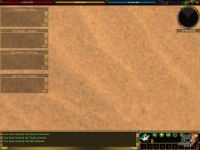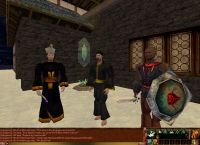Chat Interface
Related topics: User Interface
Chat Interface
This is a general guide to chat in AC and the commands used. For a full list of all possible commands that can be entered into the interface, see the Commands section.
Chat Channels
Global Chat Channel Summary
| Channel | Default | Checkbox Text | Tool Tip | Name | Tag |
|---|---|---|---|---|---|
| General | On | Listen to General Chat. | When this option is enabled, you can hear and speak on the global General chat channel. This channel is for general discussions about Asheron's Call. | general, cg | [General] |
| Trade | On | Listen to Trade Chat. | When this option is enabled, you can hear and speak on the global Trade chat channel. This channel is for arranging in-game trades with other players. | trade, ct | [Trade] |
| LFG | On | Listen to LFG Chat. | When this option is enabled, you can hear and speak on the global Looking For Group chat channel. This channel helps you find other players to adventure with. | lfg, clfg | [LFG] |
| Roleplay | Off | Listen to Roleplay Chat. | When this option is enabled, you can hear and speak on the global Roleplay chat channel. This channel is for in-character roleplaying and for discussions about roleplaying in Asheron's Call. | roleplay, crp | [Roleplay] |
Joining and Leaving the Channel
All channels can be joined and/or left in one of two ways:
Through a checkbox in the Character Settings tab of the Options UI Panel. Note that this change takes effect as soon as the checkbox is used; the Apply button does not need to be pressed before this change takes effect.
Through a text command:
/join /leave
The text command is just a shortcut to the UI checkbox, and it sets the checkbox as appropriate. The player will see a confirmation message in their chat area when they have entered or left a channel that looks like this:
You have [joinedleft] the [tag] channel.
See the Global Chat Channel Summary below for channel names and tags.
Players are automatically joined to any channels that they have checked when they login, and they will also see the join messages on login.
Talking in the Channel
Players can prefix any text they wish to send to the channel with the command symbol (/ or @) and the channel name. For instance, the following will send the message to the trade channel.
@ct I have Elysa's Crystal that I'm willing to trade for 4 MMDs!
In addition, players can also set their Chat Bar menu so that everything they type without a prefix automatically goes to the selected channel.
You may also join or leave a channel by selecting it from your Character Options panel, under Chat.
Note that players can only send text to a channel if they are currently listening to it. Players who attempt to send text to a channel that they are not listening to will see the message:
You may not speak on that channel because you are not currently listening to it.
When a player receives text from a global channel, that text will be prefixed by a channel tag (detailed below) and the name of the character who sent the text. For instance, other players listening to the trade channel when I sent the text above will see:
[Trade] Mor'gan says, "I have Elysa's Crystal that I'm willing to trade for 4 MMDs!"
All global channels will display in the same text color: a kind of blue-grey.
Squelching
Squelching rules apply to text in global chat channels in the same way that they apply to text sent in open local chat ("says"). That is, if I have a character is explicitly squelched, I will never see anything that that character says. If I have the character's account squelched, I will not see things that other characters on that account say as well.
Chat Windows
Clicking the four numbered buttons to the left of the interface will toggle a floating chat window that can be dragged around the 3D area and resized at will. The size and position of each window will be saved for each character. The floating chat windows are translucent; in normal circumstances, items can be selected through the window, and hovering the mouse over the chat window will darken it and cause it to intercept mouse clicks.
By default, all text types are displayed in the main chat window and no chat types are displayed in the floating windows. The player can, however, open the new Chat tab in the Options panel to select which types of chat display in which windows. Players may choose to display the following types of text in any (or no) windows:
- Area Chat (@say, @emote)
- Private Chat (@tell)
- Fellowship
- Allegiance (includes Allegiance Broadcast)
- General
- Trade
- LFG
- Roleplay
- Combat (not including magic)
- Magic
Gameplay (includes Recall, Craft, Advancement, Housing and System Messages, etc anything which is not communication from another player or Combat/Magic)
The Gameplay category will always display in the main window (unless individual components are filtered by the @filter command). In this way we guarantee that you cannot accidentally miss important system messages more easily than they can now. The Gameplay category can be turned on or off in the floating windows, however.
Note that this functionality is in addition to the existing text filtering capabilities. In addition, @filter allows players to filter out subtypes within the "Other" category.
In addition, players can also adjust the active and inactive opacity of the floating chat windows in the new Chat options tab (although note that this slider controls all four floating windows at once; it is not a window-by-window control).
Click Name to Tell
You can click on the name of another player when that name appears in the chat window as the originator of communication, and the following will happen:
The chat entry bar will gain focus
The text "@tell , " will appear in the chat entry bar (minus quotes).
The cursor will be at the end of this text, so that the clicking player can immediately continue with a private message to the clicked character.
Images
Click image for full size.
-
Floating Chat Windows
-
Players talking on the Allegiance Channel
-
Notes
- In Mirror, Mirror, the allegiance chat channel was introduced and the color of /tells that you send are now a dull yellow color to distinguish them from the bright yellow /tells you receive.
- In Under Cover of Night, global chat channels were introduced along with the ability to open floating windows for different configured channels.
- In Reprisals, click to tell was added to the global chat channels.


